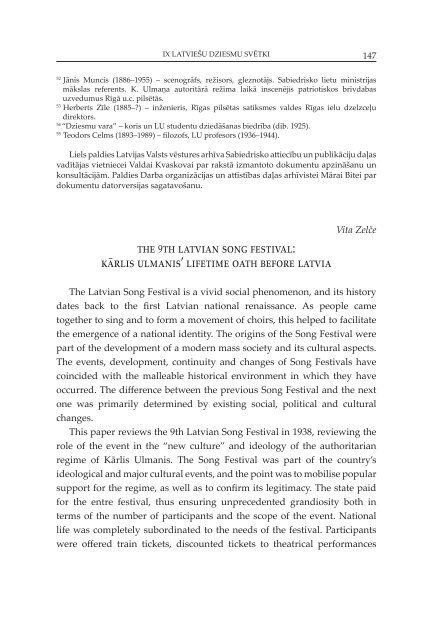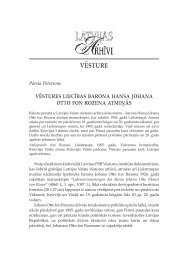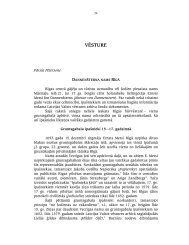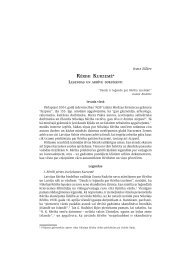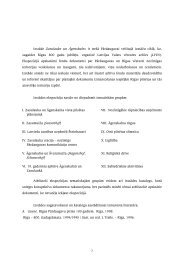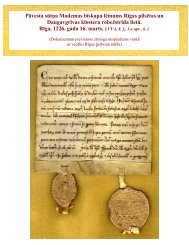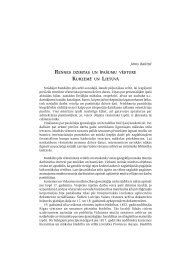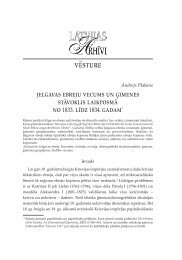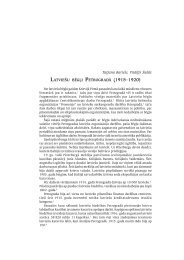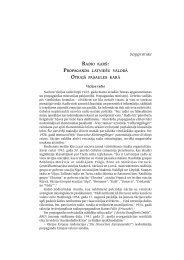vēsture - Latvijas Valsts Arhīvu sistēma
vēsture - Latvijas Valsts Arhīvu sistēma
vēsture - Latvijas Valsts Arhīvu sistēma
You also want an ePaper? Increase the reach of your titles
YUMPU automatically turns print PDFs into web optimized ePapers that Google loves.
iX latviešU DzieSmU SvētKi 147<br />
52 Jānis muncis (1886–1955) – scenogrāfs, režisors, gleznotājs. Sabiedrisko lietu ministrijas<br />
mākslas referents. K. Ulmaņa autoritārā režīma laikā inscenējis patriotiskos brīvdabas<br />
uzvedumus Rīgā u.c. pilsētās.<br />
53 Herberts zīle (1885–?) – inženieris, Rīgas pilsētas satiksmes valdes Rīgas ielu dzelzceļu<br />
direktors.<br />
54 “Dziesmu vara” – koris un lU studentu dziedāšanas biedrība (dib. 1925).<br />
55 teodors Celms (1893–1989) – filozofs, lU profesors (1936–1944).<br />
liels paldies latvijas valsts <strong>vēsture</strong>s arhīva Sabiedrisko attiecību un publikāciju daļas<br />
vadītājas vietniecei valdai Kvaskovai par rakstā izmantoto dokumentu apzināšanu un<br />
konsultācijām. Paldies Darba organizācijas un attīstības daļas arhīvistei mārai Bitei par<br />
dokumentu datorversijas sagatavošanu.<br />
the 9th latvian song festival:<br />
kārlis ulmanis’ lifetime oath before latvia<br />
Vita Zelče<br />
the latvian Song Festival is a vivid social phenomenon, and its history<br />
dates back to the first latvian national renaissance. as people came<br />
together to sing and to form a movement of choirs, this helped to facilitate<br />
the emergence of a national identity. the origins of the Song Festival were<br />
part of the development of a modern mass society and its cultural aspects.<br />
the events, development, continuity and changes of Song Festivals have<br />
coincided with the malleable historical environment in which they have<br />
occurred. the difference between the previous Song Festival and the next<br />
one was primarily determined by existing social, political and cultural<br />
changes.<br />
this paper reviews the 9th latvian Song Festival in 1938, reviewing the<br />
role of the event in the “new culture” and ideology of the authoritarian<br />
regime of Kārlis Ulmanis. the Song Festival was part of the country’s<br />
ideological and major cultural events, and the point was to mobilise popular<br />
support for the regime, as well as to confirm its legitimacy. the state paid<br />
for the entre festival, thus ensuring unprecedented grandiosity both in<br />
terms of the number of participants and the scope of the event. National<br />
life was completely subordinated to the needs of the festival. Participants<br />
were offered train tickets, discounted tickets to theatrical performances


